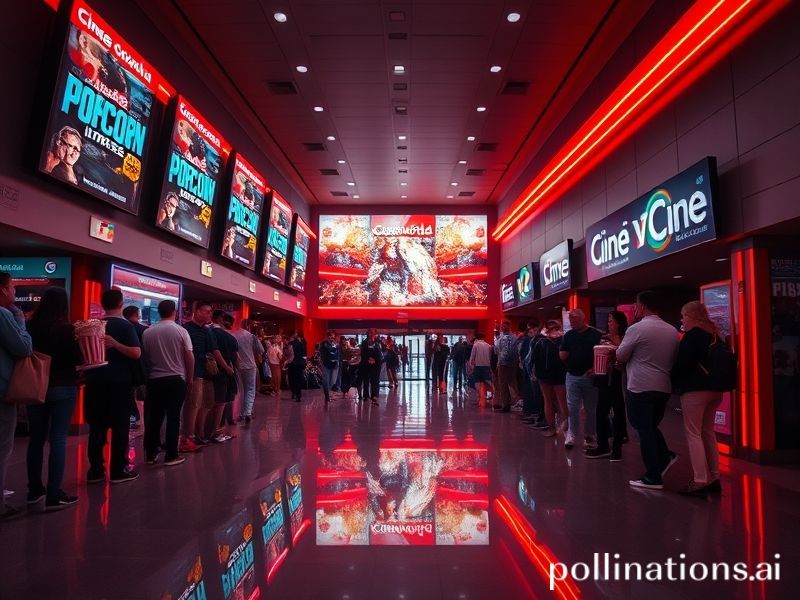Cineworld’s Global Collapse: How a $5B Debt Saga Became the World’s Most Expensive Popcorn Flick
By the time Cineworld’s creditors stopped circling like polite vultures, the company had already become a global ghost story told in surround sound. Once the planet’s second-largest cinema chain, it now exists largely as a cautionary tale: a multinational popcorn empire that mistook cheap debt for destiny and believed audiences would keep turning up just because the seats reclined. From Leicester Square to Warsaw, from suburban Ohio to downtown Tel Aviv, the lights have flickered off in 751 auditoriums, and the silence is louder than any Dolby Atmos mix.
It started, as these things always do, with ambition wearing an ill-fitting tuxedo. Cineworld swallowed Regal Entertainment in 2017 for $3.6 billion—roughly the GDP of Belize, spent on sticky-floored multiplexes and the promise that Americans would never fall out of love with $12 soda. Management christened the deal “Project Panther,” presumably because “Project Leap of Faith Off a Very Tall Building” lacked pizzazz. The debt mountain grew faster than Marvel’s cinematic universe, and then—plot twist—humanity retreated indoors for two years, binge-watching Netflix in sweatpants and discovering that subtitles don’t smell like nacho cheese.
The pandemic merely accelerated what was already inevitable: a slow, global shrug at the idea of leaving the house. South Korean ticket sales rebounded thanks to Parasite and a cultural fondness for communal sobbing, but France’s art-house faithful returned to cafés instead of cinémas, and India’s single-screen palaces pivoted to wedding receptions. Meanwhile, Cineworld’s balance sheet resembled a Tarantino bloodbath—colorful, stylized, and fatal. By 2022 the company owed $5 billion and change, or about 1.3 billion large popcorns before tax.
Creditors, those eternal optimists, have now agreed to a restructuring that wipes out existing shareholders faster than you can say “mid-credit scene.” The new owners—hedge funds with names that sound like Bond villains—will keep the projectors humming only because bankruptcy court is even more boring than Morbius. Staff from Houston to Haifa have been told to expect “efficiencies,” corporate argot for fewer ushers and more existential dread. In global terms, it’s a reminder that the entertainment supply chain is only as strong as its weakest leveraged buyout.
Yet the fallout ripples beyond boardrooms. Small towns from Scotland’s Highlands to Argentina’s Pampas suddenly find their lone cultural outpost dark, the neon “Now Showing” sign as extinct as the video store. Streaming giants—Apple, Amazon, Disney—watch from the wings, delighted that their competitors are doing the hatchet work for them. When even James Bond couldn’t lure audiences back in sufficient droves, the message was clear: 007 has been licensed to kill, but he can’t kill a virus or a business model predicated on infinite growth.
Still, humanity’s appetite for collective myth endures. In Lagos, bootleg projectors power open-air Nollywood nights; in Seoul, 4DX chairs lurch gamely through the next zombie outbreak; in refugee camps from Lesbos to Cox’s Bazar, NGOs screen films on bedsheets because stories remain cheaper than therapy. The medium is duct-taped but unbroken. Cineworld’s collapse simply confirms what every cynic already knew: scale is not safety, debt is not strategy, and reclining seats can’t compensate for a reclining attention span.
So the credits roll on a chain that once sprawled across ten countries, speaking seven languages and one universal dialect—overpriced concessions. Somewhere in London, a former Cineworld manager updates LinkedIn while humming the Mission: Impossible theme, because self-awareness is the last remaining luxury. The rest of us exit through the gift shop, pausing only to notice the metaphorical popcorn strewn across the floor: greasy, salty, and impossible to sweep away entirely. That, dear reader, is the true international language of cinema—slightly stale, slightly sad, and forever reheated for the next show that may never start.







